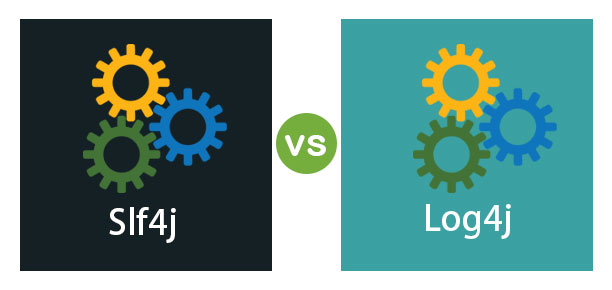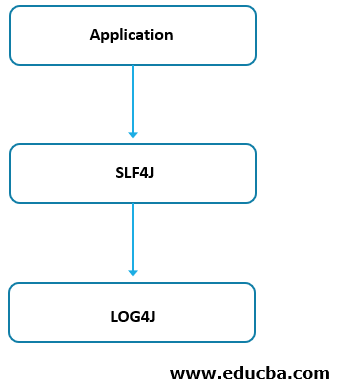Updated March 23, 2023
Difference between Slf4j and Log4j
If you are a developer then you have written a logging statement frequently in your career. We in this article have covered two of the most commonly used logging mechanism – Log4j and Slf4j. Before we begin it would be good to understand some basics covering the WHAT and WHY portion of logging. In this topic, we are going to learn about Slf4j vs Log4j.
SLF4J: It is an abbreviated term of simple logging façade for Java which enables users to plug-in the desired logging system during the deployment of the software applications. Also please note that we used the term Façade pattern which is nothing but a software design pattern that is common to use in OOP.
Log4J: It is a logging framework (i.e. a semi build application in itself) that is reliable, flexible & fast. The loggings can be categorized into various levels like trace, debug, info, error, fatal and several other modes. These loggings details are sharable to different platforms like other databases and file consoles.
WHAT – LOG FILES can be considered as a tracking history of all the activities with their outcomes. They also hold every kind of interaction details that a user had with the system either be transaction detail, information or also if something goes wrong (I mean to say if the particular activity does not perform the execution).
WHY – we need to track the issues, statements regarding loading of functions, the type of parameters we have passed, warning messages or notifications to better understand the application in the development phase and can also be used for future reference.
Head to Head Comparison Between Slf4j and Log4j (Infographics)
Below are the top 5 differences between Slf4j vs Log4j
Key Differences Between Slf4j and Log4j
Let us discuss some of the major differences between Slf4j vs Log4j:
1. Ssl4j is just an abstraction or it provides an abstraction layer and we are not using it whereas Log4j is a logging framework that has different implementations.
2. Talking of the components within this two Sl4j does not have any components as such it has a list of implementations like logback or NOPloggers and several others whereas in case of log4j it has 3 main components within namely –
- Loggers: these capture the logging information during the runtime
- Appenders: they act as outputs while publishing the logging information to different destinations.
- Layouts: they provide formatting option into various styles.
3. Talking of preferences we would like to say there is no direct comparison between ssl4j and log4j but there can be preferences based on particular situations and when to use either of them, follows below the list –
- Ssl4j is easy to use as the API’ and simple and straightforward
- Ssl4j supports all crucial logging frameworks
- Ssl4j distribution ships with bindings for different loggers like simple loggers, NOPlogger, Log4jloggeradapter, JDK14loggeradapter, and JCLLoggerAdapter.
- Ssl4j manages the Maven dependencies
- It is widely used because it is perfectly documented with all if’s and but consideration
- Ssl4j supports the diagnostic context mapping while storing the context information
- Log4j is considered safe for logging practice
- It is highly optimized for performances
- Log4j supports more than one appender (a component of log4j) per logger
- It is extensively used across the industry and sets the internalization parameters.
- Log4j supports multiple logging levels such as WARN, INFO, and ERROR.
- The logging format and destination can be altered easily by changing the layout class and by implementing the appender interface.
4. Slf4j can be configured to use Log4j as a logging backend for working together but the later conversion of not possible.
Slf4j vs Log4j Comparison Table
Let’s see some more differences between Slf4j vs Log4j
| Title | Slf4j | Log4j |
| Migration | The Slf4j is compatible with all its previous versions. A user can easily migrate from slf4j to any version without any issue. | There are several hindrances as one has to look after for the migration, talking of the Log4j2 the backward compatibility is not possible. |
| Latest version | Ssl4j has released their latest and stable version of 1.7 | Version 2.0.8 is the latest edition. |
| Choice of preferences | Libraries and embedded components should prefer ssl4j for their logging needs because these libraries do not have their choice of logging framework upon end-user. | Whenever you need a more dynamic, flexible approach that offers more features. |
| Pre-requisites | First thing first the pre-requisites vary as per the versions. Later versions have some different requirements when compared to their newer counterparts. Let us see some of these requirements –
|
There are several dependencies based on requirement but the few important and commonly considered are mentioned below –
|
| API’s | Some common slf4j API’s are –
|
Some of the log4j API’s are –
|
Conclusion
Logging is an essential part of application troubleshooting is concerned, it is a development parameter of finding issues during the development cycle. About logging, we have witnessed two crucial players i.e. CLF4J and LOG4J. We have also seen what SLF4J and LOG4J are, what possibilities they hold and how they can be used. Essentially they are used by developers for logging and have some specific usage guidelines
We have listed a block diagram of how these two fits in the logging scenario –
Recommended Articles
This is a guide to Slf4j vs Log4j. Here we discuss the key differences with infographics and comparison table. You may also have a look at the following articles to learn more –





